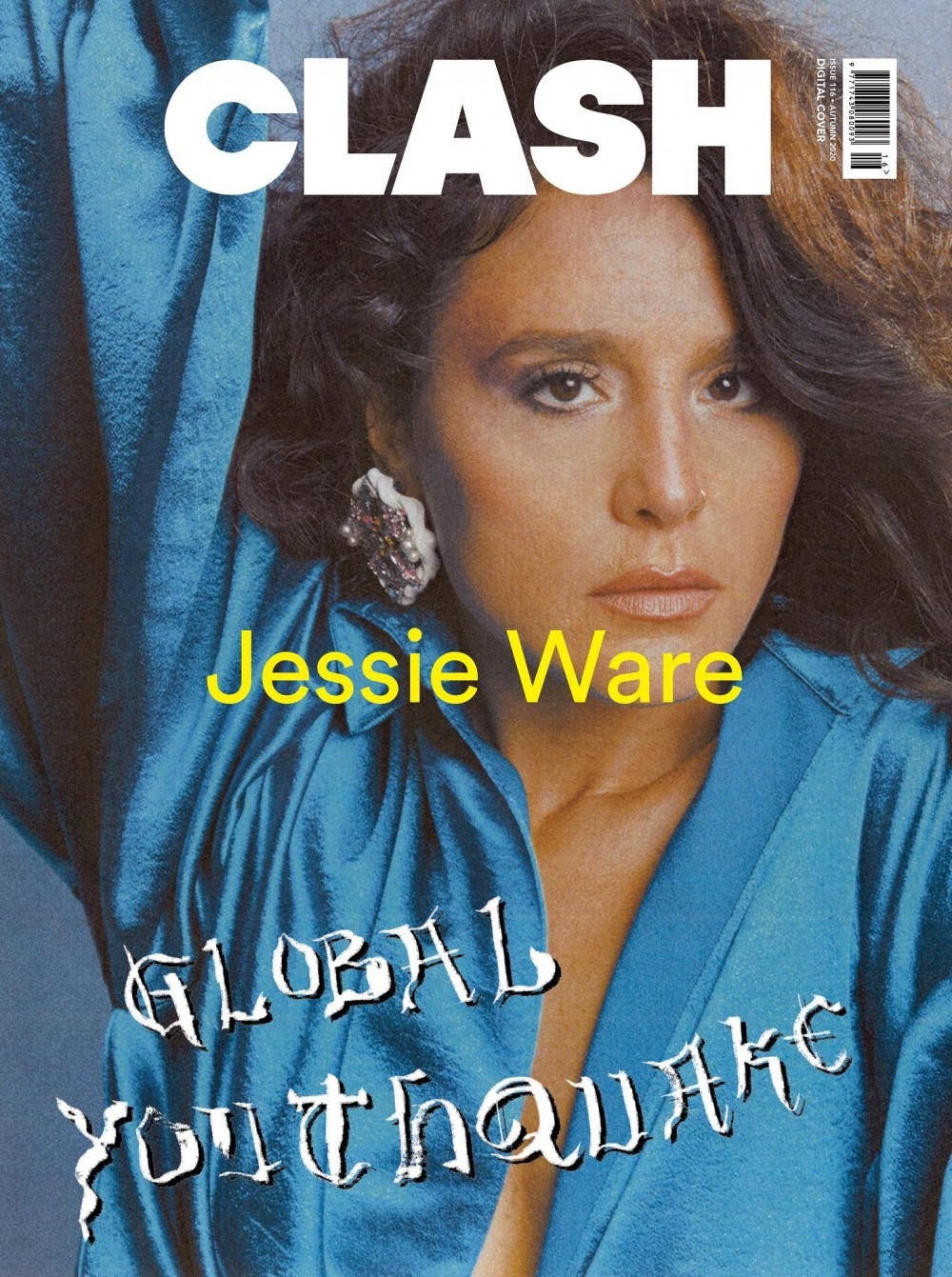By stepping into the shoes of others – and back onto the dance floor – Jessie Ware has rediscovered her own sound. And it’s unapologetically disco.
– – –
– – –
“For me it’s a lot easier to perform a role, instead of Jessie – the tired mother who’s thinking about what to have for dinner.” Jessie Ware knows a thing or two about juggling identities. She’s a Mercury-nominated ethereal soul-pop star, but she’s also the refreshingly relatable, brilliantly potty-mouthed, co-host of cookery podcast Table Manners, inviting listeners to join her and mum Lennie for dinner while they chat (and eat) with their celebrity guests. She’s a mother of two young children, but she’s also a Times Best Seller writer, with Table Manners: The Cookbook. This year she’s turned this knack for shapeshifting into a new record, stepping into the role of disco queen for ‘What’s Your Pleasure’.
It’s a marked about-turn from 2017’s ‘Glasshouse’, an understated, thoughtful album in which Jessie unpicked her feelings around motherhood and relationships. By contrast, her latest release – evoking the writhing, sweaty dance floors of New York’s Studio 54 – is as earthy and red blooded as they come, its pulsing beats and often downright sexy vocals lending tracks a technicolour sensuality, subtlety left at the club door.
‘Ooh La La’ is a funky, bass-led sequinned strut, ‘Soul Control’ a classic disco shimmy – retro backing vocals and synths flanking Jessie’s soulful riffing – meanwhile the breathless delivery of the title track spins a contemporary take on dance floor divas like Donna Summer and Debbie Harry. Elsewhere on ‘Mirage (Don’t Stop)’ Jessie pays direct homage to early ‘80s NYC post-disco heroes Indeep, proclaiming: “Last night we danced and I thought you were saving my life.” The album is an outright love letter to a glittering world, and she’s saying it with her chest.
How horribly ironic then, that Jessie turned back to club music and released this dancefloor-ready record in a year that’s seen them shut down, music lovers unable to gather together, to move and touch in time to the beat. But, she says, that could be exactly why it’s struck such a chord – critics dubbing it one of the best albums of the year while fans flock to make DIY videos of dance routines to tracks that‘ve become the soundtrack to their pandemic.
“I made this record that’s concept was supposed to be us all sweaty, together, dancing in clubs…and that hasn’t happened,” she says. “Part of disco is about togetherness, but it’s also about escapism, and people potentially needed that. People have told me ‘Remember Where You Are’ is their lockdown anthem, or they’ve played tracks off the album when they’ve finally been able to meet up with their friends after months apart.”
– – –
– – –
On the one hand lockdown’s stopped her taking the record out to people, she says, but on another it’s been sort of liberating, pushing her to be pretty much anywhere (albeit virtually) – like working with choreographers based in Paris, or with dancers and directors all over the world – and getting creative at home, making videos in the front room, husband Sam Burrows on cameraman duty while the kids are in bed. Not being able to tour has been a blow, “but instead I’m at a queer night in Chicago doing dance routines to ‘Mirage’, on Instagram Live,” she enthuses.
“I feel like people have really celebrated the record, so even if they have to wait [to see it performed] it’ll almost add to the beauty of when we get together. It’s been fully embraced, I mean globally. The Spanish tweets! I can’t read them because I cant read Spanish, but I’m getting so many from South America and Spain…I feel like this record has got out there in a way my other records haven’t.
“Hopefully it’s timeless and the songs will live with people, and take them back to a moment, a sort of nostalgia. For me that’s of this past, glamorous life – New York in the 80s – for other people maybe it’ll take them back to this mad time.”
Looking back in order to move forward – as glib as that sounds – and reconnecting with roots really is a theme here, Jessie’s returned to the club-led approach that kickstarted her career, and this year moved back to South London where she grew up, part of a groundswell of creativity – going to school (and squat parties) with Florence Welch, doing backing vocals for Jack Peñate, featuring on dance tracks for SBTRKT, before a collaboration with dubstep and grime producer DJ Joker led to her first record deal.
This time round, recording was a slightly more grown-up affair. Sessions took place in producer James Ford’s (of Simian Mobile Disco) attic studio while Jessie was pregnant – she says her baby son now knows the album instantly when he hears it – in broad daylight, working round their children’s schedules. “But there was a lot of wiggling, and a lot of imagining we were on the dancefloor,” laughs Jessie. Like a dance floor, the process was a throng of people, folding in Shungudzo Kuyimba, Model Child, Coffee (who worked on Dua Lipa’s record) and Kindness. “There was a lot of dancing, a lot of fun, it felt really light and free. A lot of shuffling on the sofa, turning it up and imagining what our night out with this record would be.”
– – –
– – –
Did she feel self-conscious, recording some of the more cartoonishly sexy vocals – the Donna Summer style “oohs” and “aaahs” – in the cold light of day? “No, weirdly,” Jessie recalls. “I learnt from day one with SBTRKT – when I was petrified of being in the studio – that the softness and the vulnerability was what people enjoyed about my voice. And then with the sexiness it was really fun to kind of play a character. Not Jessie the mother of two, more total desire and fantasy. I did this Radio 4 show about Donna Summer [Great Lives, which aired in August] and that really resonated with me. I was so intrigued about her process, how she almost played a character with ‘Love To Love You’ – I think she was pretending to be Marilyn Monroe.”
Jessie says taking the approach of the iconic Donna Summer, embodying a different character and entering an imagined world, not only helped her own performance but added a whole new dimension to ‘What’s Your Pleasure’: “That’s the beauty and the grandeur of disco and dance music, you go into the performance. And I feel like this was a more confident Jessie Ware performance in its entirety.”
Despite disputing how the album’s been defined – “I don’t proclaim that this is a disco record, it’s more a nod to a world and an era – it has disco elements.” – Jessie has also stepped into character for the aesthetic of ‘What’s Your Pleasure’, the visuals all smoky dark dancefloors spiked through with brightly coloured light and disco ball sparkle. The record’s cover references a wealth of disco legacy: a nod to Andy Warhol’s polaroids, as well as channelling iconic women like Diana Ross, Bianca Jagger, Sade, Madonna and Debbie Harry. “All of it, I was trying absorb all these brilliant women,” says Jessie. “There’s definitely more colour and sparkle than I’ve ever had. It’s fun, it’s costume.”
She surrounded herself with music of the club world too, everything from Sault – the enigmatic R&B, house and disco group bringing black centric issues to the dance floor – Tom Tom Club, Donna Summer, Blondie. “Anything that made me want to move.”
Maybe it’s not surprising that Jessie prefers to play a role: she is endearingly self deprecating, often giving collaborators and peers more credit than herself, a through-line that’s present in interviews over the years. This seemingly came to a head at the lukewarm reception to 2017’s ‘Glasshouse’ and accompanying tour, during which she has spoken about feeling burnt out, ready to quit the music game for good. That same year though she started the podcast that would propel her to national treasure status, in a totally different world with a totally different audience, and it arguably gave Jessie her mojo back – the confidence to make a record like ‘What’s Your Pleasure’.
– – –
– – –
Table Manners has seen a whole other side to Jessie (arguably the ‘real’ Jessie, no characters or performance here) blossom: effing and blinding as her and her fabulous mum Lennie niggle over each other’s recipe choices, or what aperitif to offer guests, while finding out people’s ‘death row’ meal choices and digging into their foodie loves and hates. Interviewing and cooking for everyone from Kylie, Mel C and Roisin Murphy to politician David Lammy, actor Russell Tovey, Anthony from Queer Eye, and Sandy Toksvig, the mother-daughter duo make an irresistible pair: since 2017, 80 million episodes have been downloaded, and the podcast has made countless ‘best of’ lists as well as its best selling spin-off cook book.
“I’m just very nosey,” Jessie laughs, when asked why the show has proven such a hit. “And there’s something kind of disarming talking about food. Everyone has such personal memories of food so every interview is totally different, and they conjure up these beautiful moments of nostalgia. It’s a real privilege that we get to have these mad conversations. And there’s so much cut out that I’ll never be ale to tell anyone…”
With Season 10 well underway (the Michael McIntyre episode is a surprising gem, even if you’re not a fan of his comedy) and ‘What’s Your Pleasure’ seemingly one of the best received records of her career, Jessie Ware appears to have truly found her groove. As well as working on another book – a “foodoir”, she doesn’t feel comfortable writing a memoir, “I haven’t lived an extraordinary life, this makes me feel less gross about writing about it – around food” – she’s also planning her own bat mitzvah and learning Hebrew, being taught by a poet who was actually babysat by her grandma.
It’s another return to her roots, this time to her Jewish heritage, but she says it’s also an excuse for a big get-together, once people can finally do that again: “I feel like everyone needs a bit of a party,” she says, reflecting on why she’s taking this on at the same time as so much other work. “And I’ve had so much fun making this record I’m just gonna carry on with this energy.”
– – –
– – –
‘What’s Your Pleasure’ is out now. Find Table Manners HERE.
Words: Emma Finamore
Photography: Jack Grange
Fashion: Grace Joel
Creative Direction: Rob Meyers
Join us on the ad-free creative social network Vero, as we get under the skin of global cultural happenings. Follow Clash Magazine as we skip merrily between clubs, concerts, interviews and photo shoots. Get backstage sneak peeks, exclusive content and access to Clash Live events and a true view into our world as the fun and games unfold.

